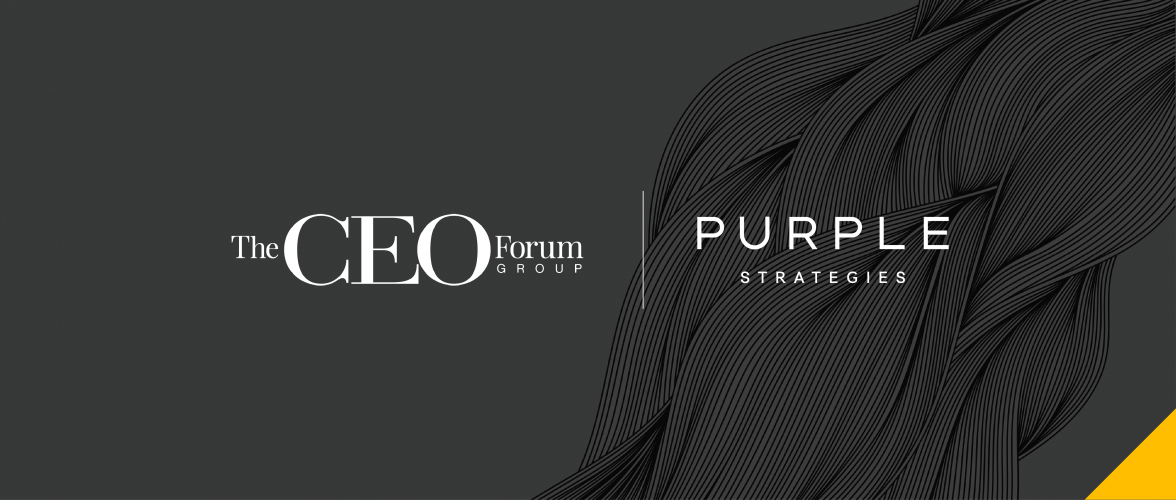4 Lessons for Leaders from The CEO Forum’s Third Transformative CEO Summit
Purple Strategies is the thought leadership and polling partner of The CEO Forum Group and Transformative CEO Summit. The CEO Forum convened its third Transformative CEO Summit on September 21, 2021, featuring top CEOs of leading companies discussing creative ways to solve today’s most pressing challenges.
Top CEOs convened in September for the third installment of the Transformative CEO Summit to discuss a host of topics – from the effectiveness of hybrid work models to opinions on the status of post-pandemic operations. They met against the backdrop of continuing pandemic-related health and economic risks, a spate of costly and destructive weather events across the U.S., and state laws on key and controversial social issues making national headlines. As broader societal issues increasingly land on the desks of top executives, one timely topic of discussion centered on CEO perspectives and ambitions around Environmental, Social and Governance (ESG).
As an area of business focus, issues falling under the ESG category such as climate change have historically been deprioritized in favor of more immediate-term issues. More recently, however, CEOs have felt pressure from critical stakeholder groups including investors, customers and their own employees to move these issues to the forefront of company priorities.
These key groups, along with the next generation of talent, increasingly demand companies become more socially and environmentally responsible, at the same time shareholders push to take a holistic approach to company valuation that considers a corporation’s non-monetary factors in business decision making, risk identification, and evaluating growth opportunities.
At its core, the principles of ESG resonate with a wide range of influential stakeholders, and CEOs recognize not only the value but also the increasing importance of setting ESG goals and communicating their initiatives to drive reputational equity. Below are key insights from CEOs at the Summit around the accelerating ESG challenges and opportunities in today’s business landscape:
(1) ESG today demands moving from words to actions.
As the ESG space matures, smart CEOs look for ways to integrate these issues more deeply into their business planning. Integrating ESG into areas of business focus is no longer a “nice to do” but a “must do” to keep stakeholders engaged and prove the company’s value. To see success in the ESG space, CEOs share the importance of setting concrete and attainable goals, which force their companies to follow through and act on the plans. Making ESG changes goes beyond chasing positive PR and must be woven into the fabric of the company to drive credibility.
(2) Corporate ESG storytelling requires skill and nuance.
ESG began as a way for investors to evaluate a company’s risk and opportunity profile holistically outside of monetary factors. Now, however, ESG is often something companies want to tout more broadly to tell their story to a broader audience. Many companies have put considerable effort into designing and executing ESG initiatives, and understandably want to be able to tell their story to a range of stakeholders – not just investors and internal audiences, but end consumers and future talent as well. Business leaders, however, recognize the inherent challenge of “promoting” their ESG commitments and progress without coming across as superficial, performative or self-serving. Other leaders question the best ways to compel consumers to care enough about the company’s ESG efforts that it impacts their final purchase decision or translates into long-term reputational equity. Despite these challenges, CEOs at the September Summit agreed that successful companies will differentiate themselves in the marketplace by clearly and compellingly sharing their company’s ESG progress and successes to critical stakeholder groups.
(3) The ESG through-line is people.
Within ESG, the Environment pillar may be most recognizable externally given the growing focus on environmental sustainability, but CEOs gravitated most toward Social and Governance as the priority areas for business focus during the recent Summit. A few CEOs summarized ESG as ultimately being about treating people better, which is central to all the pillars, particularly Social and its focus on issues like diversity and social justice efforts within companies, evolving expectations around the employer-employee relationship, and the public’s expectation for companies to engage in social issues that aren’t directly tied to their business. These sentiments were underscored in polling data collected from executives attending the event:
Q. Which single component of “E-S-G” is the biggest area of focus for your business/industry as you look ahead to 2022?
- Social (for example, employee relations and diversity, working conditions, local communities, local conflict) = 53%
- Environment (for example, waste and pollution, greenhouse gas emissions, climate change) = 35%
- Governance (for example, tax strategy, donations and political lobbying, corruption and bribery, board diversity and structure) = 12%
(4) Meeting ESG goals is the key to future business success.
During the Summit, CEOs discussed how meeting ESG goals often demands a longer timeline than financial returns but can lead to more important rewards in the future. An inclusive, diverse workforce, clean water and a healthier planet offer benefits far greater than financial gains but cannot be realized in a matter of quarters – an understanding and commitment that must be shared by employees, C-Suites and boards alike. The most successful companies will integrate ESG thinking into all aspects of their businesses to meet their goals, impress and gain the support of their key stakeholders, and stand out from their competitors.
Purple Strategies is the thought leadership and polling partner of The CEO Forum Group and Transformative CEO Summit. Purple formed 12 years ago when two political firms that were asked regularly to partner together to bring a mix of “Red” and “Blue” perspectives to corporate challenges decided to join forces. Through the years Purple has continued to evolve, bringing in diverse perspectives across a multitude of disciplines. Today, Purple is an independent, fully integrated corporate reputation strategy firm, inspired by politics, driven by data and insights, partnering with clients around the world to anticipate, navigate, and compel change. Purple blends the creativity of brand communications and the speed and strategy of political campaigns to serve Fortune 500 companies, coalitions, associations, non-profits, and some of the most recognizable brands in the world.

 What does corporate leadership look like in a divided nation?
What does corporate leadership look like in a divided nation?  Waiting to Engage in D.C. Is the Most Expensive Mistake You’...
Waiting to Engage in D.C. Is the Most Expensive Mistake You’...  The Era of High-Stakes Uncertainty
The Era of High-Stakes Uncertainty  What Forces are Shaping the Future for CMOs?
What Forces are Shaping the Future for CMOs?